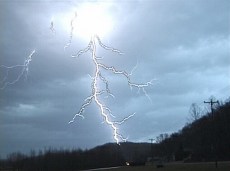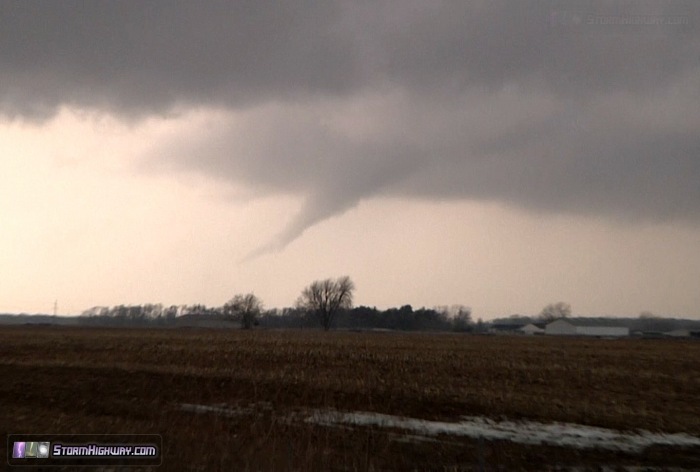Winter lightning, severe storms and thundersnow: Can lightning occur in the winter or when it is snowing?
|
In September of 2025, my work is generating the most income it ever has in my career. Yet, I'm being forced to shut down my successul operation, against my will, due to one cause alone: 95% of that revenue is being stolen by piracy and copyright infringement. I've lost more than $1 million to copyright infringement in the last 15 years, and it's finally brought an end to my professional storm chasing operation. Do not be misled by the lies of infringers, anti-copyright activists and organized piracy cartels. This page is a detailed, evidenced account of my battle I had to undertake to just barely stay in business, and eventually could not overcome. It's a problem faced by all of my colleagues and most other creators in the field. |
Thunderstorms, lightning and severe weather can and do occur any time of the year at almost any location on earth. Lightning during the winter is actually very common in mid-latitude climates, including most of the United States. There are three scenarios where lightning can be observed during the winter season and during winter precipitation: in 'normal thunderstorms, in thundersnow/thundersleet and at high-elevations.

Above: Christmas season lightning in St. Louis in December 2012.
Thundersnow
Strong winter snowstorms and blizzards commonly produce lightning strikes, a phenomenon referred to as 'thundersnow'. Lightning and thunder can occur with any type of winter precipitation - including snow, sleet ('thundersleet') and freezing rain.
Thundersnow requires very strong upward vertical air movement within a winter storm, and is usually associated with highly baroclinic low pressure systems with a source of warmer air (not necessarily above freezing) wrapping into the storm. The warmer air ingested into the system helps to introduce instability into the cold sector of the storm, which along with the ambient upward vertical motion can produce prolific lightning activity. ('Baroclinic' means a transition zone between cold and warm air.) Strongly baroclinic lows are common with nor'easters in New England and springtime/late fall snowstorms in the Midwest, which have sources of warm air to their south to entrain into the system. A strong enough low, or one that is rapidly strengthening, can produce thundersnow even without a good source of instability-producing warm air.
Lake-effect snow on the shores of the Great Lakes is a common producer of thundersnow. Lake-effect thundersnow is common in early-season events (November through December), when the first cold air masses begin passing over the still-warm lake waters, maximizing instability.
VIDEO CLIP 1: Thundersnow during a March snowstorm in Illinois
VIDEO CLIP 2: Thundersleet in West Virginia
Thundersleet and lightning during freezing rain is common with warm frontal thunderstorms in the winter, which occur in association with elevated instability present overtop of a subfreezing surface layer. This scenario is common when strong warm advection rapidly follows a shallow arctic airmass intrusion. In this case, these 'elevated' thunderstorms are simply 'normal' warm-sector storms feeding off of a layer of warm air above the surface, rather than at the surface. When the surface layer is below freezing in such a situation, the raindrops from the storms will freeze as they fall into the cold air - either before hitting the ground (sleet) or after (freezing rain).
Winter thunderstorms and severe weather
Normal 'garden variety' thunderstorms (just like the ones in spring and summer) are very common during the winter months in the United States, particularly in the southern half of the country east of the Rockies.

The Gulf of Mexico and the tropics remain a source of warm, moist air year-round. This warmth and moisture occasionally makes its way northward into the USA during the winter, allowing for 'normal' thunderstorm conditions to develop as far north as the warm air can make it. Every once in a while, conditions for severe thunderstorms and even tornadoes are possible. In fact, just like the Great Plains does in the spring, Alabama, Mississippi and Georgia actually have their own peak tornado season - from December to January! Violent storms and tornadoes are not unusual events the southern USA during winter.
FACT SHEET: List of historically significant wintertime tornado outbreaks in the USA
VIDEO CLIP 3: January lightning over the Arch in St. Louis
VIDEO CLIP 4: Christmas season lightning in St. Louis
VIDEO CLIP 5: Towers in Kentucky hit by lightning 11 times in February
VIDEO CLIP 6: February cloud-to-ground lightning in Illinois
VIDEO CLIP 7: Illinois tornadoes in February with snow on the ground
VIDEO CLIP 8: Illinois tornadoes in December

ABOVE: Winter tornadoes? They can happen! This tornado near Jacksonville, Illinois happened on February 20, 2014. Notice the snow still on the ground!
Another good case study on the subject is the state of West Virginia, no stranger to wintertime lightning with thunderstorms observed at least once between November and February nearly every year. The lightning strike in the photo at the top of this section was captured during a strong thunderstorm near Huntington in February of 2003 (note the leafless trees), while snow was still on the ground in some locations. Possibly the most infamous wintertime lightning event in the Mountain State was the Tallmansville/Sago storm of January 2, 2006, in which a lightning strike caused an underground mine explosion which resulted in the death of 12 coal miners (View a video clip of this storm).
High-elevation thunderstorms
Thunderstorms are common among the snowy peaks of very high mountain ranges (such as the Himalayas and the Alps) during strong storms. High-elevation thunderstorms with frozen precipitation can occur at any time of the year at the world's highest ridges, and are a well-known threat to climbers.
Examples of winter lightning, thundersnow and severe weather
As a storm chaser, I have frequently observed and captured lightning and severe storms during the winter. The following links lead to cover logs of these events, some with photos and video clips:
 | December 1, 2018 Illinois tornadoes |
 | February 28, 2017 Illinois tornado |
 | January 16, 2017 Illinois thunderstorms |
 | November 3, 2016 St. Louis thunderstorms |
 | February 20, 2016 Illinois thunderstorms |
 | December 26, 2015 Illinois thunderstorms |
 | December 16, 2015 Illinois thunderstorms |
 | February 20, 2014 Illinois tornadoes |
 | February 1, 2014 Missouri freezing thunderstorms |
 | December 20, 2013 Illinois thunderstorms |
 | February 25, 2013 Illinois thundersleet |
 | December 19, 2012 St. Louis thunderstorms |
 | December 9, 2012 Tennessee/Missouri thunderstorms |
 | February 28-29, 2012 Illinois thunderstorms |
 | January 23, 2012 Missouri thunderstorms |
 | January 17, 2012 St. Louis thunderstorms |
 | March 26, 2011 Illinois thundersnow |
 | February 27, 2011 St. Louis area winter severe storm/tornado event |
 | December 31, 2010 St. Louis area winter severe storm/tornado event |
 | February 18, 2009 West Virginia winter thunderstorms |
 | January 10, 2009 West Virginia winter thunderstorms |
 | March 8, 2008 Thundersleet during icy road accidents |
 | February 5, 2008 "Super Tuesday" severe weather/tornado outbreak |
 | February 4, 2008 West Virginia winter thunderstorms |
 | January 2, 2006 WV thunderstorms (Sago coal mine storm) |
 | February 22, 2003 West Virginia thunderstorms |
 | February 20, 2002 West Virginia thunderstorms |
 | January 24, 2002 West Virginia thunderstorms |
 About the Author: Dan Robinson has been a storm chaser, photographer and cameraman for 34 years. His career has involved traveling around the country covering the most extreme weather on the planet including tornadoes, hurricanes, lightning, floods and winter storms. Dan has been extensively published in newspapers, magazines, web articles and more, and has both supplied footage for and appeared in numerous television productions and newscasts. He has also been involved in the research community, providing material for published scientific journal papers on tornadoes and lightning. |
GO: Home | Storm Chase Logs | Photography | Extreme Weather Library | Stock Footage | Blog
Featured Weather Library Article:
|